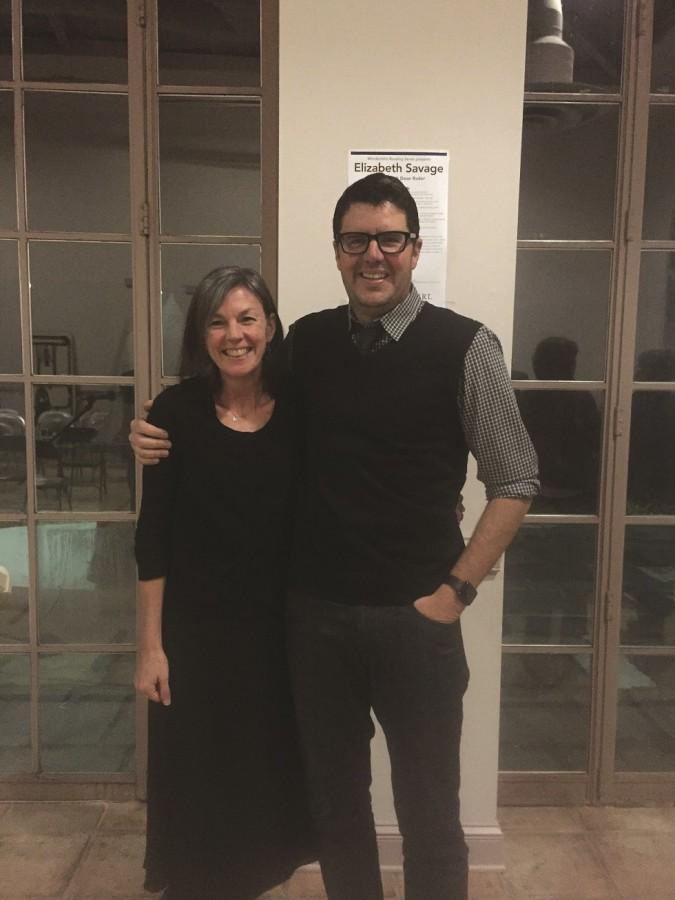Good friends and poets, Elizabeth Savage and Dean Rader, spoke for students, staff, and community members at a poetry reading Wed. night, March 4, at Bucks.
Savage, of West Virginia, is known for her short and resonating poems. Her inspirations are renowned poets such as E.E. Cummings and Lorine Niedecker.
She is an author, poetry editor, and professor of English at Fairmont State University.
During the poetry reading, Savage read from her upcoming chapbook, Parallax. She also read from her two other books of poems, Grammar and Idylliad.
She wrote about companionship in Parallax. Her inspiration behind the piece was about a mother who “worries that her son didn’t worry enough,” explains Savage.
Grammar was written because she likes “writing sexy poems about grammar.” She wrote a piece titled “Capitalization” explaining how “the upper case always has the upper hand and it is not humiliated.”
She spoke of an “ocean of refusal” as it continues to fight in her poem titled “Pacific”, and she spoke of reliving days and schedules in her poem called “Circles.”
Savage’s inspiration to write Idylliad came from the idea to “use poetry as a way to look at where I live.” Hence, it is a book about West Virginia.
“It was a strange way to look into my everyday life, and to look at West Virginia the way I once had when I first moved to the state,” says Savage.
She ended the reading with her shortest poem, “Archaic Smile,” which is also very powerful. It is a grief poem explaining that we must rest.
Savage’s collections connect humans and nature in short, and stunning, five-line poems. When asked why she chose to write poetry she said, “I am attracted to the compression of poetry and the sound components.”
“I remember after hearing poetry for the first time feeling so awake,” Savage describes.
She says, “We need to learn to love spending time alone because it is a comfort.” She shares how she learned to love being alone and how it became a guiding light for her strong poems.
Rader, a professor of English at the University of San Francisco, is a poet who always keeps a whistle in his pocket and writes poems about adventure.
Compared to Savage’s poems, his are much longer and filled with vivid imagery and common address issues that we most care about.
He explained to the audience that his students have never seen snow; an inspiration for his poem “Blizzard” from his book, Self Portrait.
The poem talks about how snow wants to be rain. Rader writes, “Snow falls because it cannot descend” and “to fall is to lose.” He claims, “Snow is tired of losing.”
This powerful poem, like many others of Rader’s, reaches out to the audience as if to be speaking to them. People are tired of losing and want to live life to the fullest. Like snow, they want to be free.
His inspiration for “The Poem Chooses Its Own Adventure” came from choose your own adventure books. It’s a way for readers to reread the same book but each time choose a different storyline.
This poem is not about the adventure, but rather about you, the reader. Rader talks about the poem giving so many different adventures, but questions, “when was the last time you did anything for the poem?”
Like so many of us in our everyday lives, the reader always has expectations; but so does the poem.
“It is about care, attention, and giving, and the reader is the taker,” says Rader.
Rader’s biggest inspiration is celebrated writer, Emily Dickinson. When asked what his goal is with poetry, Rader said, “I want the poem and the book to be like a White Stripes album and make it connective to readers.”
He said, “I am my most authentic communicative self when writing poetry.”
Rader started out wanting to be a journalist, but he didn’t fall in love with it the way he fell in love with poetry. He admits, “My biggest challenge was gratitude because I wanted to contribute.”
Rader teaches us a very important lesson in the pursuit of happiness: “You have to fall in love with what you do,” he explains.


